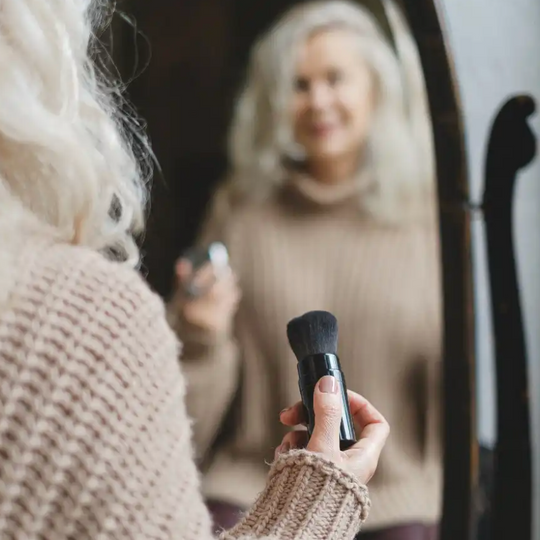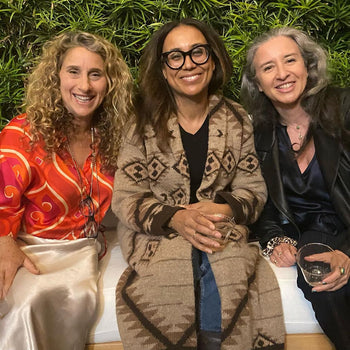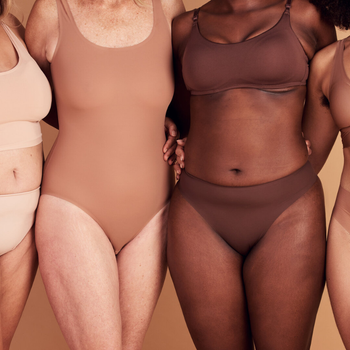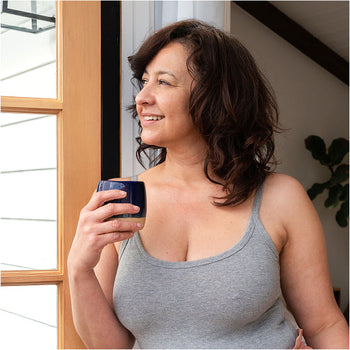This piece was originally featured on:
Do you feel like you’re not seen as beautiful anymore — or even noticed at all? Maybe it feels like you’ve lost yourself in the daily grind and barely recognize the person staring back at you in the mirror. Sadly, it’s common to feel ignored or unappreciated during middle age. In fact, as many as 70 percent of women say they start to feel “invisible” as young as age 52. This phenomenon can lead to anxiety, depression, and withdrawal from social outings or other opportunities for connection.
Of course, sometimes those mental health effects are unavoidable, especially if you’re going through peri/menopause. “Your estrogen and progesterone balance shifts, but that’s not an imbalance,” says Suzanne Gilberg-Lenz, MD, an OB-GYN specializing in integrative women’s health and a medical advisor for Kindra. “It’s physiologic. The transitions happening in your body can change how you feel in your body.” When sleep disruption, vaginal dryness, mood swings, and hot flashes pile up, it’s a combo that would make anyone feel uncomfortable. But there are plenty of steps you can take to feel better in your body and rev up your self-confidence in midlife.
“Locating online communities online that support your perspective and offer you solutions, educating yourself, and doing things you enjoy can be healing,” says Dr. Suzanne. “And that includes not doing things you don’t like, if you don’t have to do them for survival.”
Think of revamping your perspective as an inside job, one you have control over. “In the end, we have agency over our own existence and lives. We get to take back that power over how we move through the world,” says Dr. Suzanne.
Here are six expert-approved ways to reignite your inner light and start feeling not just visible but vibrant in your second act.
Accept that aging is a natural part of life
Getting older (and wiser) is worth embracing. After all, there’s no way to stop our biological clocks from ticking. “We can blame society and say, ‘Society doesn’t value or emphasize women after a certain age,’ or we can look at it from what psychologists call an internal locus of control where we look at how we can control and shape our own experience,” says Chloe Carmichael, Ph.D., a clinical psychologist and author of Nervous Energy: Harness the Power of Your Anxiety. “I encourage women to think about their own beliefs and behaviors, and how they can shape and control those, rather than focus on the expectations they imagine society is placing upon them.”
Open up about how you’re feeling with yourself and your inner circle
Omisade Burney-Scott thinks it’s vital to break through the taboos and talk openly about getting older. She’s the founder of Black Girl’s Guide to Surviving Menopause, a podcast, community, and resource for Black women, women-identified, and gender-expansive people that holds conversations around the shared experience of aging.
“When you have the audacity to live inside of a body that’s identified as woman, femme, or gender-neutral, and you’re also Black, or fat, or poor, or old, or queer, you get pushed even further to the margins, and don’t feel like there’s a space for you to be honest around what you don’t know, what you’re afraid of, what you’re curious about, and what you want to explore,” says Burney-Scott. That’s why she teamed up with our friends at Kindra to create the Say More Conversation Deck, a curated collection of conversation cards and journal prompts designed to help you open up the dialog around how you’re feeling during your new life stage.
“We want to give people an opportunity to remember that we don’t operate in a vacuum. Nothing that we see in the world or experience as an individual doesn’t have a context,” says Burney-Scott. Spending time sifting through the card deck can help reveal how you’re showing up on your menopausal journey.
The Say More Deck explores themes like rising into your own and becoming more aware of your thoughts by posing questions that’ll guide you to reflect deeply such as, How can you take up more space in your life? How can you encourage others to do the same? and When was the last time you were aware (or made aware) of your age? How did that feel?
“I feel very passionately that storytelling is the thing that helps you connect, learn, unlearn, heal, and deepen your political analysis or awareness,” says Burney-Scott. “We’re in a liminal space between one iteration of ourselves to the next and we can illuminate that and use tools like the Say More deck to help people talk about it.”














